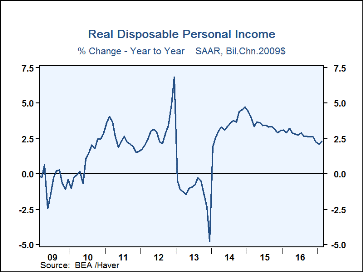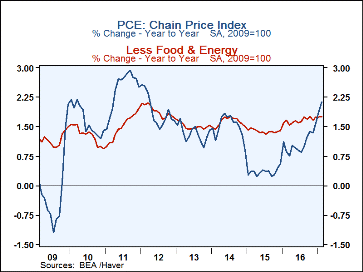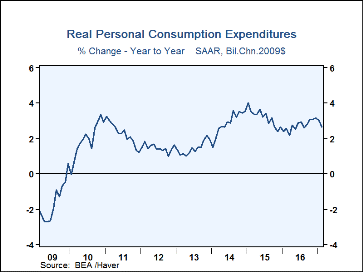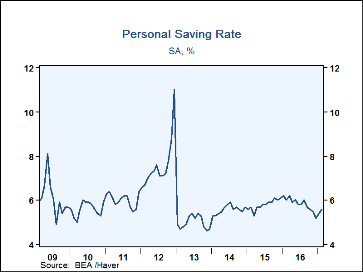 Global| Mar 31 2017
Global| Mar 31 2017U.S. Personal Income & Pricing Power Firm; Spending Growth Eases
by:Tom Moeller
|in:Economy in Brief
Summary
Personal income increased 0.4% last month (4.6% y/y) following a 0.5% January rise, revised from 0.4%. The gain matched expectations in the Action Economics Forecast Survey. The increase raised y/y growth to 4.6%, its best since May [...]
Personal income increased 0.4% last month (4.6% y/y) following a 0.5% January rise, revised from 0.4%. The gain matched expectations in the Action Economics Forecast Survey. The increase raised y/y growth to 4.6%, its best since May 2015. A strengthened 0.5% increase (5.5% y/y) in wages & salaries has raised growth in overall income. Rental incomes also were strong where a second consecutive 0.8% (6.5% y/y) increase occurred. These gains were accompanied by a 0.2% increase (3.8% y/y) in transfer receipts, powered by a fourth straight 0.4% rise (4.7% y/y) in Medicare payments. Proprietors income ticked 0.1% higher (3.6% y/y).
Disposable personal income increased 0.3% (4.4% y/y) following a 0.4% rise. After accounting for a 0.1% uptick in prices, the 0.2% increase followed three months of little change. The 2.3% y/y increase was below, however, its peak of 3.5% during all of 2014 and 2015.
The PCE chain price index rose 0.1% following a 0.4% jump. The y/y gain strengthened to 2.1%, its quickest rate of increase since March 2012. The index excluding food & energy rose 0.2%. The 1.8% y/y increase also approximated the strongest gain since 2012. The index for energy goods & services declined 1.3% (+18.4% y/y) and the food price index ticked 0.1% higher (-1.5% y/y).
Personal spending improved 0.1% (4.8% y/y) in February after an unrevised 0.2% increase. A 0.2% gain had been expected. When adjusted for higher prices, personal spending eased 0.1% (+2.6% y/y) after a 0.2% decline. Spending on durable goods eased 0.1% (+7.6% y/y) after a 1.1% drop. It reflected a 1.8% drop (+2.6% y/y) in spending on "other" durable products, but spending on home furnishings & appliances rose 0.5% (5.5% y/y). Recreational goods & vehicles spending rose 0.3% (10.8% y/y) and spending on motor vehicles improved 0.1% (8.7% y/y). Real purchases of nondurable products ticked 0.1% higher (2.8% y/y), but clothing purchases fell 1.1% (+0.4% y/y). Spending on gasoline & oil increased 1.4% (-2.3% y/y). Services spending eased 0.1% (+1.8% y/y) for a second straight month. Housing & utilities spending fell 0.3% (+0.3% y/y), but recreation spending jumped 0.5% (1.9% y/y).
The personal savings rate improved to 5.6% from 5.4%. It was the highest level since October. The level of personal saving declined, however, by 1.7% y/y.
The personal income & consumption figures are available in Haver's USECON database with detail in the USNA database. The Action Economics figure is in the AS1REPNA database. Further detail is in USNA.
The 2017 Budget and Economic Outlook from the Congressional Budget Office can be found here.
| Personal Income & Outlays (%) | Feb | Jan | Dec | Feb Y/Y | 2016 | 2015 | 2014 |
|---|---|---|---|---|---|---|---|
| Personal Income | 0.4 | 0.5 | 0.3 | 4.6 | 3.6 | 4.4 | 5.2 |
| Wages & Salaries | 0.5 | 0.4 | 0.3 | 5.5 | 4.3 | 5.1 | 5.1 |
| Disposable Personal Income | 0.3 | 0.4 | 0.3 | 4.4 | 3.9 | 3.8 | 5.1 |
| Personal Consumption Expenditures | 0.1 | 0.2 | 0.6 | 4.8 | 3.8 | 3.5 | 4.4 |
| Personal Saving Rate | 5.6 | 5.4 | 5.2 | 6.0 (Feb. '16) |
5.9 | 5.8 | 5.6 |
| PCE Chain Price Index | 0.1 | 0.4 | 0.2 | 2.1 | 1.1 | 0.3 | 1.5 |
| Less Food & Energy | 0.2 | 0.3 | 0.1 | 1.8 | 1.7 | 1.4 | 1.6 |
| Real Disposable Income | 0.2 | -0.1 | 0.1 | 2.3 | 2.8 | 3.5 | 3.5 |
| Real Personal Consumption Expenditures | -0.1 | -0.2 | 0.4 | 2.6 | 2.7 | 3.2 | 2.9 |
Tom Moeller
AuthorMore in Author Profile »Prior to joining Haver Analytics in 2000, Mr. Moeller worked as the Economist at Chancellor Capital Management from 1985 to 1999. There, he developed comprehensive economic forecasts and interpreted economic data for equity and fixed income portfolio managers. Also at Chancellor, Mr. Moeller worked as an equity analyst and was responsible for researching and rating companies in the economically sensitive automobile and housing industries for investment in Chancellor’s equity portfolio. Prior to joining Chancellor, Mr. Moeller was an Economist at Citibank from 1979 to 1984. He also analyzed pricing behavior in the metals industry for the Council on Wage and Price Stability in Washington, D.C. In 1999, Mr. Moeller received the award for most accurate forecast from the Forecasters' Club of New York. From 1990 to 1992 he was President of the New York Association for Business Economists. Mr. Moeller earned an M.B.A. in Finance from Fordham University, where he graduated in 1987. He holds a Bachelor of Arts in Economics from George Washington University.
More Economy in Brief
 Global| Feb 05 2026
Global| Feb 05 2026Charts of the Week: Balanced Policy, Resilient Data and AI Narratives
by:Andrew Cates










